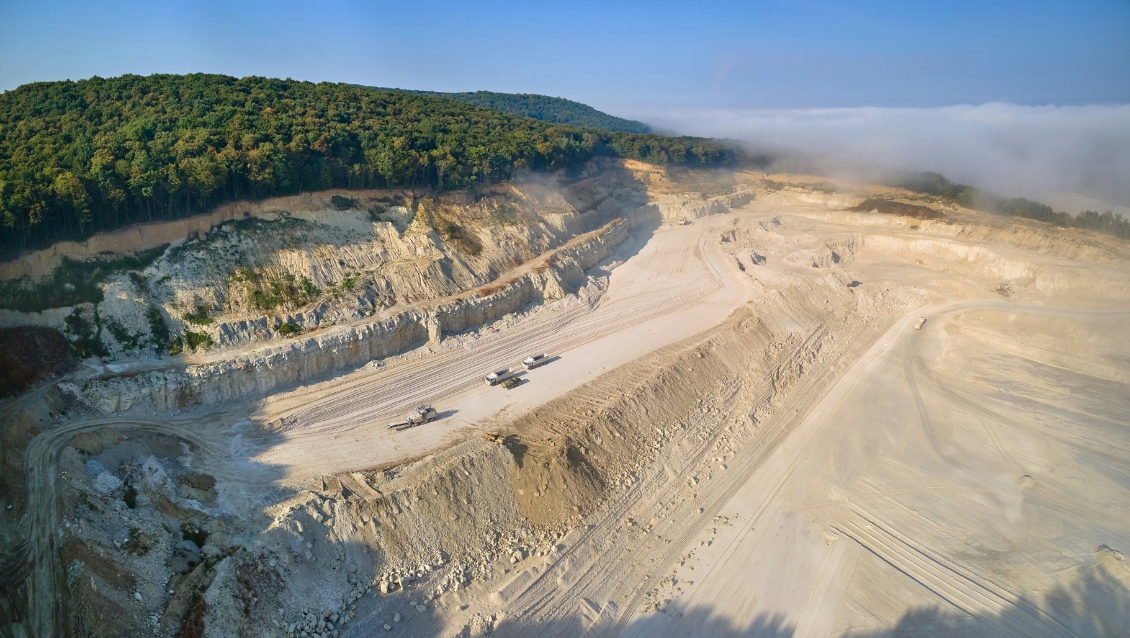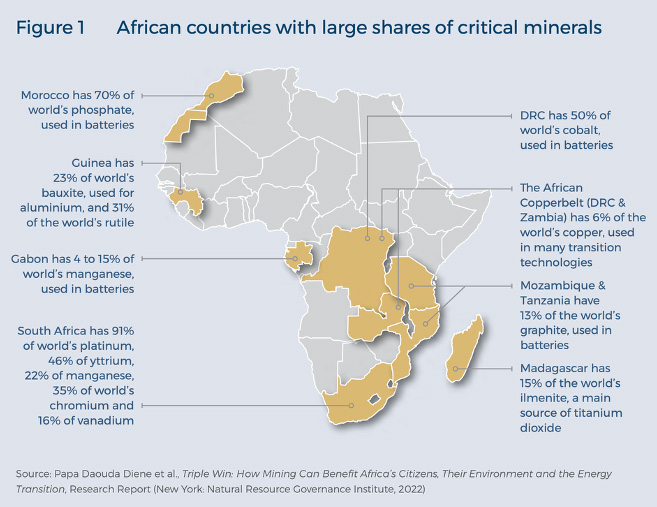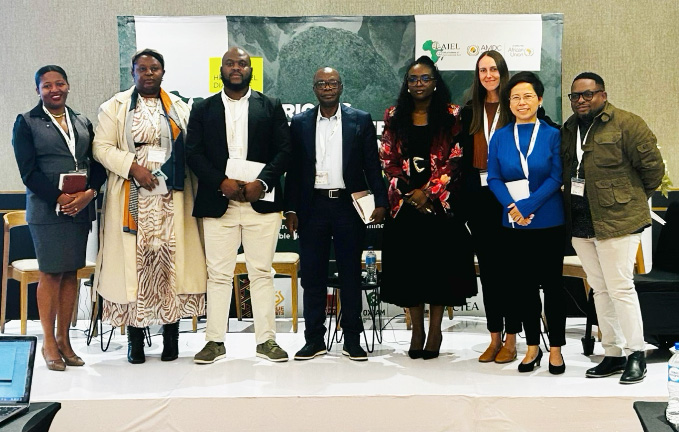The Role of Africa’s Critical Minerals in a Just Energy Transition: In Conversation with the Just Transition and Responsible Business Conduct in Africa Consortium

Posted on 2 June 2025
This conversation with the Danish Institute for Human Rights and its African partners explores lessons, challenges and hopes for a people-centred approach to the Africa’s critical mineral wealth.
Executive Summary
- This article captures reflections from a panel discussion with the Danish Institute for Human Rights (DIHR) and its African partners on promoting human rights and responsible business conduct in Africa’s critical minerals sector.
- The project seeks to embed social and environmental protection into Africa’s energy transition by documenting impacts, fostering accountability and strengthening regional collaboration.
- At an event in Lusaka, panellists highlighted widespread issues – from water and land rights violations to unfair compensation and weak grievance mechanisms – drawing on case studies from Zimbabwe, Tanzania, Zambia and the DRC.
- Panellists called for stronger enforcement of existing protections, greater awareness among civil society, and deeper engagement with policymakers at all levels.
- The conversation underscores the urgency of centring communities in Africa’s mineral value chains to ensure the transition benefits rather than harms the people who live closest to the resources.
This ‘In Conversation’ insight article features a discussion with the Danish Institute for Human Rights (DIHR), HakiRasilimali, the Zimbabwe Environmental Law Association (ZELA), African Resources Watch (AFREWATCH) and the Centre for Environment Justice (CEJ). In consortium, the organisations are currently collaborating to implement a project to support the promotion and protection of human rights in the Just Transition in Africa, with a particular focus on the role of transition minerals.
This insight article will discuss the project as well as insights of a panel consisting of the consortium partners focused on advancing responsible business conduct in Africa’s critical energy transition minerals. The panel took place as part of a two-day High-Level Regional Policy Dialogue on Africa’s critical minerals hosted in Lusaka from 27-28 May by the African Institute for Environmental Law and the African Minerals Development Centre, in partnership with DIHR, True Costs Initiative, Oxfam, Global Witness, Centre for Transnational Environmental Accountability, and the Policy Monitoring and Research Centre.
In addition, after the dialogue, Adrian Joseph, research fellow at the South African Institute of International Affairs, sat down with DIHR and its consortium partners to discuss the outcomes of the panel. This insight article provides an overview and insights into the project, conference, panel, and interview with the consortium for the benefit of users of the African Green Minerals Observatory.
Africa’s Critical Minerals: The Opportunities and the Challenges
The global effort to mitigate climate change is driving significant demand for critical minerals with demand for these minerals set to accelerate in the coming decades. At present, many countries in sub-Saharan Africa contribute significantly to the supply of critical minerals and have the potential to benefit from the green energy transition-induced mining expansion.
Africa’s mineral-rich economies could benefit greatly from the increase in demand for critical minerals such as cobalt, lithium, graphite and manganese, but realising this ambition would require targeted policies that focus on developing domestic processing capacity and supporting socially and environmentally responsible mining.

African Countries with Large Shares of Critical Minerals
While critical mineral wealth has the potential to promote resource-led industrialisation in many African countries, there is also the likelihood that a substantial increase in demand for these minerals will unleash a new wave of social and environmental challenges. Many of the minerals crucial to the energy transition are concentrated in African countries that have struggled historically with fragility, weak governance and rent-seeking behaviour in the mining industry.
In summary, if Africa is to successfully exploit its critical mineral endowments, it will have to navigate a complex geopolitical environment, manage important domestic policy trade-offs and foster regional cooperation to strengthen the developmental impacts of the mining sector on the continent.
Conference Overview: High-Level Dialogue on Africa’s Critical Mineral Value Chains
It was in this context that the Africa Institute of Environmental Law (AIEL) hosted a two-day High-Level Regional Policy Dialogue under the theme of “Africa’s Critical Minerals Value Chain: Exploring Opportunities and Challenges.” The event took place from 27-28 May 2025 in Lusaka, Zambia, and brought together African think tanks, policymakers, industry leaders, and experts in critical minerals trade and value chain analysis. Discussions centred primarily on unpacking the challenges and opportunities associated with leveraging Africa’s mineral resources within the context of the global energy transition.
The panel and plenary discussions focused on a wide variety of topics related to Africa’s critical mineral resources including policy development, regional cooperation, geopolitics, human rights, geological data, and financing. In short, the discussions helped to facilitate knowledge exchange, foster partnerships, and help develop policy frameworks to ensure that Africa’s critical minerals contribute to the region’s sustainable development and economic growth.
Project Overview: Just Transition and Responsible Business Conduct in Africa
This section will provide a brief overview of the project implemented by the Danish Institute for Human Rights (Denmark), in consortium with the Zimbabwean Environmental Law Association (Zimbabwe), HakiRasilimali (Tanzania), AFREWATCH (Democratic Republic of the Congo), and the Centre for Environment Justic (Zambia).
The project entitled ‘Supporting a Just Transition Through Responsible Business Conduct in Africa’ is funded by the Swedish International Development Agency and will operate from 2024-2027. The overall aim of the project is to support the promotion and protection of human rights in the context of the just transition in Africa, with a specific focus on transition or critical minerals.
The project will be carried out in two focus countries, namely Zimbabwe and Tanzania, with activities focusing on responsible business conduct capacity, implementation and dialogue at the country level in the context of a just energy transition. In addition, this national component will be complemented by a regional component focusing on regional multistakeholder engagement on the just transition, as well as regional thematic analysis, dialogues and advocacy on responsible business conduct and transition minerals. The regional component will include a cross-border case study focused on the Copperbelt region between Zambia and the Democratic Republic of Congo (DRC).
At the national level, the overarching object of the project will be realised through three concrete workstreams, namely:
- identifying and documenting human rights impacts associated with transition minerals business activities as well as conducting policy analysis;
- supporting access to remedy associated with transition minerals business activities; and
- strengthening stakeholder capacity and conducting multistakeholder policy dialogues on responsible business conduct and the just transition.
These workstreams will be complemented by three further workstreams at the regional level, which includes:
- integrating human rights and responsible business conduct in a zonal just transition case study;
- regional policy analysis, dialogues and advocacy on responsible business conduct and the just transition; and
- integrating human rights and responsible business conduct in investment and value chains for the just transition.
For more information about the background, partners, and objectives of the project, please visit the DIHR website to find out more by the following the link here.
Panel Overview: Advancing Responsible Business Conduct in Africa’s Critical Minerals
On day two of the dialogue, panel five focused on the topic of ‘Advancing Responsible Business Conduct in Africa’s Green/Critical Energy Transition Minerals.’ The panel included members from the four civil society organisations involved in the DIHR consortium project as well as discussants from other organisations. In short, the panel discussed issues on human and land rights, drawing on lessons from their respective countries, including the DRC, Tanzania, Zambia and Zimbabwe.

Panel Participants (L to R): Lucy Shao (HakiRasilimali), Jennifer Mwanangombe (Centre for Environment Justice), Obert Bore (Zimbabwe Environmental Law Association), Dieudonne Been Masudi (AFREWATCH), Alaka Lungonzo (Global Witness), Nicole Loser (JETA), Jingjing Zhange (CTEA), and Darlington Muyambwa (Danish Institute for Human Rights)
Darlington Muyambwa from DIHR began his moderation of the panel by reiterating the importance of the concept of responsible business conduct for discussions on critical minerals. Before introducing the panel participants, Darlington also emphasised the need to adopt a people-centred approach when discussing the issues and lessons around human rights and critical minerals in local communities, stating that “We are proud of our session this morning because it seeks to explore the people and communities behind the value chains.” Thereafter, he concluded his opening remarks by introducing the panellists from the respective consortium partner organisations and providing a brief overview of the project – see the section above for more detailed information on the project. The bulk of the panel discussion was focused on giving each panellist an opportunity to outline some of the challenges and lessons local communities were experiencing with regard to mining activities. What follows is a brief summary of their respective remarks on the lessons and challenges they have learned from working on the issue of critical minerals in their respective local communities.
Obert Bore from the Zimbabwe Environmental Law Association, began his response by highlighting the water-intensive nature of hard-rock lithium mining and processing. He argued that Zimbabwe is already a water-strained country and that the lithium mining processes, due to the significant amount of water resources they require, were already having negative effects on local communities who relied on those water sources for their livelihoods. On this point, he cited the example of the Bikita Minerals operation, Zimbabwe’s largest lithium mine which had been accused of polluting water resources and drawing unsustainable amounts of water from a local dam that supported the livelihoods of local residents. In addition, Obert also cited concerns around unfair labour practices, forced relocation of communities, loss of livelihoods, and environmental damage. He concluded his remarks by saying that these effects on local communities were an indictment of the regulatory frameworks meant to govern business conduct in Zimbabwe.
Lucy Shao from HakiRasilimali structured her remarks by focusing on the issues stemming from nickel mining projects in Tanzania. For example, she discussed some of the challenges associated with compensating communities who had been relocated from their land, citing issues of unfair compensation amounts, a lack of process transparency, and no available avenues for local communities to appeal or negotiate the evaluations of their land. Apart from these concerns, she also highlighted the detrimental effects new and existing mining projects were having on the agricultural productivity and livelihoods of farmers in the region. Speaking on this issue and the need for redress, she stated that “the bitter truth is that there is no commitment or livelihood restoration programme in place … And these people [affected local communities] have nowhere to go to register their concerns, because in most cases, whatever mechanism is existing at operational level is mostly controlled by companies … and these people are complaining about companies’ misconduct.” Lucy concluded her remarks by asking the audience to question what impact these mining projects could have on the future livelihoods and food security of local communities.
Jennifer Mwanangombe from the Centre for Environment Justice prefaced her contribution to the discussions by outlining the Zambian government’s ambitions to expand copper production. In response to these governmental ambitions, she raised her concerns about the potential human rights violations this new production may engender. As an example, she highlighted the recent case study of Sino Metals’ pollution of the Kafue River after a toxic waste storage facility at a copper processing plant burst, releasing approximately 50 million litres of acidic waste into the river which serves as a lifeline for many local communities. Moreover, speaking on the issue of compensation, she described how many communities had been implicitly forced into signing compensation agreements with little to no recourse available to them to challenge these agreements, stating: “When they [local communities] run to the people who are supposed to be leading them and who are supposed to be protecting them, they are being told to just go ahead and sign the papers that have been given to you … If you don’t sign, it means you will lose out on this land and you will not be compensated at all. So, you find that communities settle for very little in terms of compensation, because they are scared if they don’t sign these documents, they will lose out.”
Dieudonne Been Masudi of AFREWATCH opened his remarks by highlighting the significant role played by the DRC in global critical mineral value chains. He argued that the despite this significant mineral wealth, the country continues to face significant governance, environmental, and social challenges. For example, communities living near mining projects are often displaced or affected by pollution, with limited protection or compensation under existing laws. Moreover, while the DRC revised its major mining legislation in 2018, enforcement remains weak, and the interests of mining companies often take precedence over the rights of communities, according to Dieudonne. In addition, he stressed the urgent need for the development of a national strategy or vision for mineral production and governance in DRC, citing countries such as Chile and Indonesia as case studies worth considering and emulating. Finally, he questioned the DRC’s signing of international agreements, such as the Lobito Corridor and past resource-for-infrastructure deals with China, which he argued have yet to yield any significant benefits in terms of tangible development outcomes.
In response to these concerns raised across the different case studies, Darlington next asked both the panellists and the respondents to provide some practical recommendations and insights to help address these issues. In their collective responses, the panellists and the respondents stressed the need for greater implementation of existing environmental and human rights protections, the establishment of operational grievance mechanisms, and greater awareness among civil society organisations and communities on mining issues. Questions from the plenary focused on the dangers of state capture in the mining sector and the need for civil society organisations to work more closely with governments in designing policy that ensures affected communities are at the centre.
Informal Interview Discussion: SAIIA and the DIHR Consortium Partners
After the conclusion of the formal proceedings, Adrian Joseph, research fellow at the South African Institute of International Affairs, had an opportunity to sit down with Nora Götzmann and Darlington Muyambwa from DIHR as well as Lucy Shao from HakiRasilimali and Obert Bore from ZELA, to exchange on the proceedings.
First, when asked about key takeaways, the consortium partners expressed a few key points:
- For starters, there was a recognition of the need for greater integration of responsible business conduct principles into existing African mineral policy frameworks such as the African Green Minerals Strategy.
- In addition, the consortium partners acknowledged that while there are many challenges facing the governance of Africa’s transition minerals, it is important to also spotlight case studies of successful stewardship of Africa’s mineral resources, to draw on practical strategies that could be replicated or adapted.
- Other points raised include differentiating between the concepts of value addition and added value, recognising that there are alternative pathways to developing Africa’s mineral resources beyond solely focusing on the beneficiation of critical minerals.
- In addition, the consortium partners also emphasised the need to engage policymakers at different levels of government, including national government ministries, parliaments, and regional bodies.
- Finally, the participants were asked about their hopes for the Just Transition and Responsible Business Conduct in Africa Project as it begins its work. Collectively, individuals from their respective organisations hoped that the project would provide more in-depth case studies as well as cross-border and regional lesson sharing to help improve the governance of Africa’s critical mineral resources.
Adrian Joseph concluded the engagement, thanked the consortium partners for their time, and wished them the best for their important work ahead.